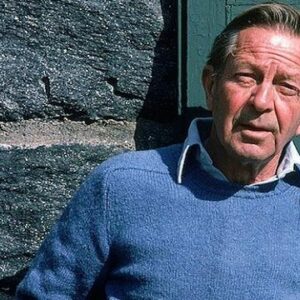John William Cheever was a well-known novelist and short story writer who is widely regarded as one of the twentieth century’s most significant short fiction writers. His writings are primarily set in the vicinity of Manhattan, Massachusetts, and Italy. His fictional plots frequently centered on the duality of human nature, manifested as internal conflicts within a single character or conflict between two characters who personify polar opposite aspects of the human personality. Along with human nature, he explored the theme of nostalgia for a bygone era. ‘The Enormous Radio’, ‘Goodbye My Brother’, ‘The Country Husband’, and ‘The Swimmer’ are among his most popular short stories. Though he is best known for his short fiction, he also wrote the popular novel ‘The Wapshot Chronicles,’ which was nominated for a National Book Award. He was born into a prosperous family and enjoyed an idyllic childhood until the Great Depression struck and his father lost his prosperous business. Things began to deteriorate, and his family suffered greatly. John was expelled from school as a child, and as a result, he wrote his first published short story, ‘Expelled.’ After years of struggle, he established himself as a writer but succumbed to alcoholism, impairing both his personal and professional life.
Childhood & Adolescence
He was Frederick Lincoln Cheever’s second child with Mary Liley Cheever. His father was a prosperous shoe salesman who provided a comfortable upbringing for his children. The business, however, suffered during the Great Depression.
In 1926, he enrolled at Thayer Academy and transferred to Quincy High in 1928. He returned to Thayer in 1930 but was expelled. Cheever published a story titled ‘Expelled’ about his expulsion in ‘The New Republic’.
His family’s financial difficulties persisted, and his parents divorced. This was a particularly trying and mentally taxing time for him. Later in life, his parents reconciled, and he reestablished contact with them.
Career of John
For a time, he traveled between Manhattan, Saratoga, Lake George, and Quincy. He possessed few material possessions and lived as a nomad, despite the fact that he continued to write.
In 1935, ‘The New Yorker’ purchased his story ‘Buffalo’ for $45. This was the first of numerous stories he would submit to the newspaper. From 1935 to 1941, Maxim Lieber was his literary agent.
In 1938, he began working in Washington, D.C., for the Federal Writers’ Project. He was dissatisfied with his work and left after a year.
He enlisted in the army during World War II in 1942. Throughout this time period, he continued to write. In 1943, he published his first collection of short stories, ‘The Way Some People Live.’ The book received a mixed response from critics.
By the end of the war, he was married and had a family. He relocated to Manhattan with his family following the war. In 1946, Random House Publishing advanced him $ 4,800 to resume work on his novel, ‘The Holly Tree.’ He began writing the novel prior to the war.
In May 1947, he published his short story ‘The Enormous Radio’ in an issue of ‘The New Yorker. The story of a sinister radio that broadcasted private conversations between individuals quickly gained popularity.
He began work on a lengthy story titled ‘The Day the Pig Fell into the Well’ in 1949 but did not publish it for another five years.
In 1951, he completed his story ‘Goodbye, My Brother.’ The following year, he was awarded a Guggenheim Fellowship. In 1953, he published ‘The Enormous Radio,’ a collection of short stories that received positive reviews.
He completed ‘The Wapshot Chronicle’ in 1956. A few years later, in 1964, he published ‘The Wapshot Scandal,’ which received rave reviews.
In 1964, his short story ‘The Swimmer’ was published in ‘The New Yorker’s’ July issue. In 1966, the novel was adapted into a film starring Burt Lancaster and featuring a cameo appearance by the author.
While he was gaining popularity, the pressures of celebrity were beginning to wear on him. He developed an alcoholism problem, and his marriage suffered as a result of his personality disorders. He was also persecuted by society for his bisexuality.
His career suffered for a few years before reviving in 1977 with the novel ‘Falconer.’ It quickly rose to the top of the New York Times Best Seller list. His next book, ‘The Stories of John Cheever,’ was published in 1978 and quickly became one of his most popular works.
Significant Works of John
His best-known work was a collection of short stories titled ‘The Stories of John Cheever.’ It contained several of his most popular works, including ‘The Enormous Radio,’ ‘Goodbye, My Brother,’ ‘The Country Husband,’ and ‘The Swimmer.’ It was the recipient of several prestigious awards.
Awards and Accomplishments
John Cheever’s collection of short stories, ‘The Stories of John Cheever,’ was awarded the 1979 Pulitzer Prize for Fiction and a National Book Critics Circle Award.
In 1982, the American Academy of Arts and Letters presented him with the National Medal for Literature.
Personal History and Legacies
In 1941, he married Mary Winternitz. The couple was blessed with a son and a daughter. He was a recovering alcoholic, which had a negative impact on his health, personal life, and professional career.
He later enrolled in New York’s Smithers Alcoholic Rehabilitation Unit and never drank again. He was diagnosed with cancer in 1981 and died in 1982 after the disease ravaged his entire body.
Estimated Net worth
The net worth of John is $10million.


